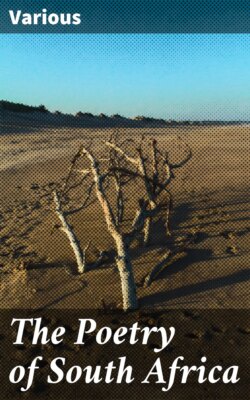Читать книгу The Poetry of South Africa - Various - Страница 5
На сайте Литреса книга снята с продажи.
THE EMIGRANTS.
ОглавлениеTable of Contents
… The sire has told
The heart-struck group of dark disaster nigh:
Their old paternal home must now be sold,
And that last relic of ancestry
Resigned to strangers. Long and strenuously
He strove to stem the flood’s o’erwhelming mass;
But still some fresh unseen calamity
Burst like a foaming billow—till, alas!
No hope remains that this their sorest grief may pass.
“Yet be not thus dismayed. Our altered lot
He that ordains will brace us to endure.
This changeful world affords no sheltered spot,
Where man may count his frail possessions sure:
Our better birthright, noble, precious, pure,
May well console for earthly treasures marred—
Treasures, alas! how vain and insecure,
Where none from rust and robbery can guard:
The wise man looks to heaven alone for his reward.”
The Christian father thus. But whither now
Shall the bewildered band their course direct?
What home shall shield that matron’s honoured brow,
And those dear pensive maids from wrong protect?
Or cheer them ’mid the world’s unkind neglect?
That world to the unfortunate so cold,
While lavish of its smiles and fair respect
Unto the proud, the prosperous, the bold;
Still shunning want and woe; still courting pomp and gold.
Shall they adopt the poor retainer’s trade,
And sue for pity from the great and proud?
No! never shall ungenerous souls upbraid
Their conduct in adversity—which bowed
But not debased them. Or, amidst the crowd,
In noisome towns shall they themselves immure,
Their wounds, their woes, their weary days to shroud
In some mean melancholy nook obscure?
No! worthier tasks await, and brighter scenes allure.
A land of climate fair and fertile soil,
Teeming with milk and wine and waving corn,
Invites from far the venturous Briton’s toil:
And thousands, long by fruitless cares foresworn,
And now across the wide Atlantic borne,
To seek new homes on Afric’s southern strand:
Better to launch with them than sink forlorn,
To vile dependence in our native land;
Better to fall in God’s than man’s unfeeling hand!
With hearts resigned they tranquilly prepare
To share the fortunes of that exile train.
And soon with many a follower, forth they fare—
High hope and courage in their hearts again:
And now, afloat upon the dark-blue main,
They gaze upon the fast-receding shore
With tearful eyes—while thus the ballad strain,
Half heard amidst the ocean’s weltering roar,
Bids farewell to the scenes they ne’er shall visit more:—
“Our native land—our native vale—
A long and last adieu!
Farewell to bonny Teviot-dale,
And Cheviot mountains blue!
“Farewell, ye hills of glorious deeds,
And streams renowned in song;
Farewell, ye blithesome braes and meads
Our hearts have loved so long.
“Farewell, ye broomy elfin knowes,
Where thyme and harebells grow!
Farewell, ye hoary haunted howes,
O’erhung with birk and sloe.
“The battle-mound, the Border-tower,
That Scotia’s annals tell;
The martyr’s grave, the lover’s bower—
To each—to all—farewell!
“Home of our hearts! our father’s home!
Land of the brave and free!
The sale is flapping on the foam
That bears us far from thee!
“We seek a wild and distant shore
Beyond the Atlantic main;
We leave thee to return no more,
Nor view thy cliffs again:
“But may dishonour blight our fame,
And quench our household fires,
When we, or ours, forget thy name,
Green Island of our Sires.
“Our native land—our native vale—
A long, a last adieu!
Farewell to bonny Teviot-dale,
And Scotland’s mountains blue.”
Thomas Pringle.
Huntschaw, Sept. 20, 1819.
